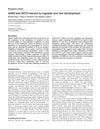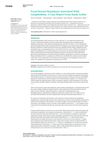 67 citations,
November 2002 in “Journal of The American Academy of Dermatology”
67 citations,
November 2002 in “Journal of The American Academy of Dermatology” The document concludes that careful evaluation is key to diagnose and treat women with hair loss, with tests for thyroid, iron, and hormones as needed.

Different hair and nail conditions can indicate health issues and have specific treatments; accurate diagnosis is crucial before treatment.
 194 citations,
March 2003 in “American Journal of Pathology”
194 citations,
March 2003 in “American Journal of Pathology” Stress stops hair growth in mice by causing early hair growth phase end and harmful inflammation through a specific nerve-related pathway.
 11 citations,
September 1992 in “Journal of pineal research”
11 citations,
September 1992 in “Journal of pineal research” Immunizing goats against melatonin can temporarily change their cashmere growth cycles and increase fleece production.
 10 citations,
March 2007 in “Dermatology”
10 citations,
March 2007 in “Dermatology” Sex-determining genes may affect male baldness.
 91 citations,
April 2011 in “Journal of Ethnopharmacology”
91 citations,
April 2011 in “Journal of Ethnopharmacology” Polygonum multiflorum extract helps grow hair by activating certain hair growth signals in mice.
 144 citations,
July 2002 in “Clinical and Experimental Dermatology”
144 citations,
July 2002 in “Clinical and Experimental Dermatology” Telogen effluvium is a common type of hair loss that can resolve on its own or become chronic, with treatment depending on early diagnosis.
 12 citations,
December 2009 in “Amino Acids”
12 citations,
December 2009 in “Amino Acids” Putting α-methylspermidine on mouse skin can start hair growth.
 121 citations,
May 2009 in “Journal of Ethnopharmacology”
121 citations,
May 2009 in “Journal of Ethnopharmacology” Eclipta alba extract may help hair grow similarly to Minoxidil.
 275 citations,
March 1999 in “Journal of The American Academy of Dermatology”
275 citations,
March 1999 in “Journal of The American Academy of Dermatology” Chemotherapy can cause various skin reactions, with hair loss being the most common, and proper diagnosis and treatment of these reactions are important.
 15 citations,
April 2003 in “Journal of dermatology”
15 citations,
April 2003 in “Journal of dermatology” Alopecia areata causes hair loss due to an immune attack on hair follicles, influenced by genetics and environment.
 52 citations,
May 2003 in “The journal of investigative dermatology/Journal of investigative dermatology”
52 citations,
May 2003 in “The journal of investigative dermatology/Journal of investigative dermatology” Parathyroid hormone-related protein helps control hair growth phases in mice.
138 citations,
March 2021 in “Journal of the American Academy of Dermatology” Ritlecitinib and brepocitinib effectively regrow hair in alopecia areata patients.
 17 citations,
January 2016 in “American Journal of Epidemiology”
17 citations,
January 2016 in “American Journal of Epidemiology” Men with male pattern baldness have a higher risk of dying from prostate cancer.
 7 citations,
January 2003 in “Elsevier eBooks”
7 citations,
January 2003 in “Elsevier eBooks” Testosterone is crucial for development, growth, and various body functions in mammals.
 10 citations,
December 2014 in “PubMed”
10 citations,
December 2014 in “PubMed” Finasteride, a hair loss drug, may cause sexual dysfunction and depression, but these effects are usually temporary and the drug is generally safe. More research is needed.
 January 2003 in “American Journal of Clinical Dermatology”
January 2003 in “American Journal of Clinical Dermatology” In 2002, various skin reactions were reported due to different drugs, including allergies, hair loss, skin lesions, and other skin conditions.
 131 citations,
September 2017 in “Molecular and Cellular Endocrinology”
131 citations,
September 2017 in “Molecular and Cellular Endocrinology” The document concludes that blocking the internal pathways that create androgens might help treat cancers that depend on sex hormones.
 12 citations,
January 2007 in “Current problems in dermatology”
12 citations,
January 2007 in “Current problems in dermatology” Environmental and cosmetic factors, including heat, chemicals, and sun exposure, can cause hair loss and damage.
 157 citations,
October 2003 in “Development”
157 citations,
October 2003 in “Development” AXR3 and SHY2 genes control the growth and timing of root hair development in plants.
 45 citations,
December 2006 in “Biopolymers”
45 citations,
December 2006 in “Biopolymers” Permanent waving weakens hair by altering its protein structure.
 June 2020 in “bioRxiv (Cold Spring Harbor Laboratory)”
June 2020 in “bioRxiv (Cold Spring Harbor Laboratory)” The HoxC gene cluster and its enhancers are essential for developing hair and nails in mammals.
 81 citations,
February 1997 in “Journal of Investigative Dermatology”
81 citations,
February 1997 in “Journal of Investigative Dermatology” Minoxidil boosts hair growth by activating PGHS-1.
 506 citations,
March 2005 in “The Journal of Clinical Endocrinology and Metabolism”
506 citations,
March 2005 in “The Journal of Clinical Endocrinology and Metabolism” Testosterone therapy improves physical function, strength, and body composition in older men with low testosterone levels.
December 2022 in “Biomedicine” Men with early onset hair loss are more likely to have high uric acid levels.
 98 citations,
December 2003 in “The FASEB Journal”
98 citations,
December 2003 in “The FASEB Journal” Thymosin β4 promotes hair growth by activating stem cells in hair follicles.
 90 citations,
October 1998 in “Animal Reproduction Science”
90 citations,
October 1998 in “Animal Reproduction Science” Mouflon rams mature gradually with changes in body, horns, and hormones linked to age and seasons, reaching full sexual maturity well after puberty.
 49 citations,
January 2003 in “American Journal of Clinical Dermatology”
49 citations,
January 2003 in “American Journal of Clinical Dermatology” Effective management of children's hair loss involves accurate diagnosis, various treatments, and supportive care.
 13 citations,
April 2023 in “Nature communications”
13 citations,
April 2023 in “Nature communications” Long COVID patients have more health issues than non-infected people.

A 12-year-old girl in Saudi Arabia with Focal dermal hypoplasia showed skin and dental symptoms, highlighting the condition's variability and the need for personalized treatment.




























